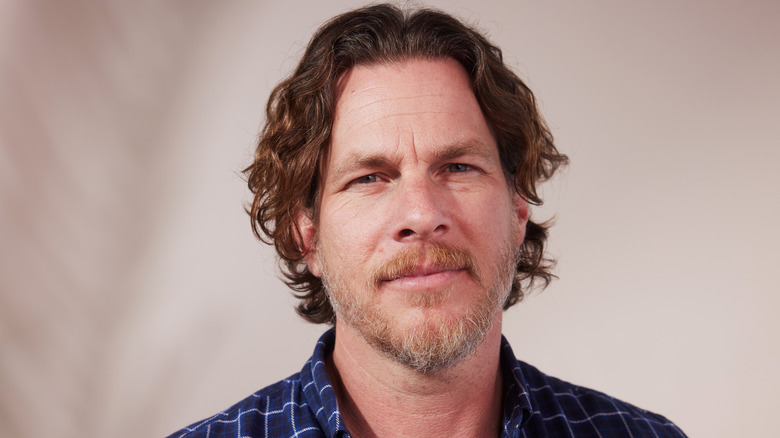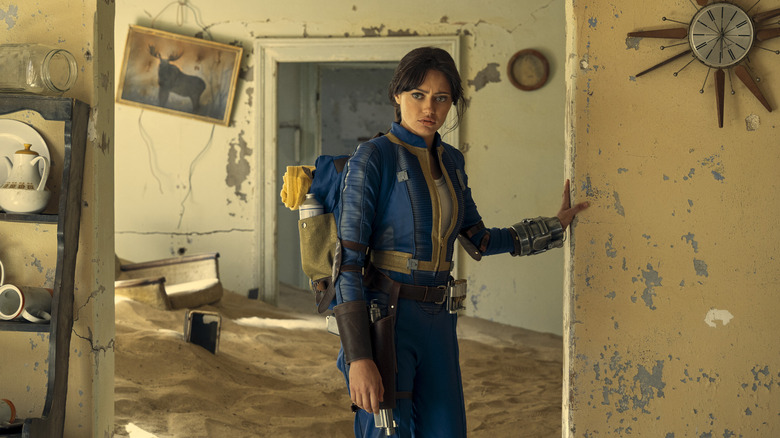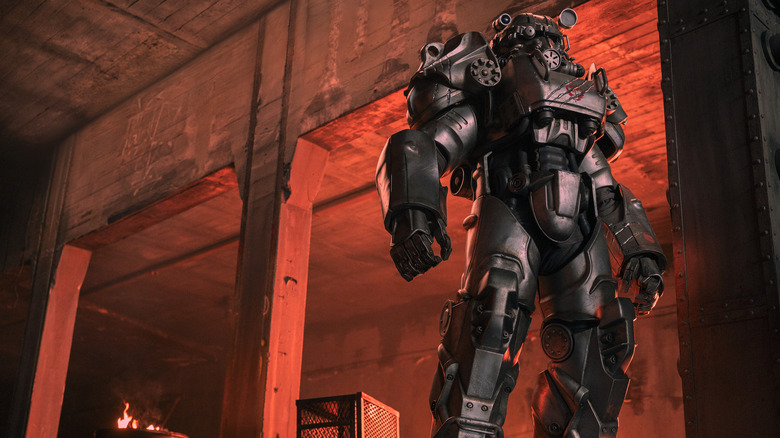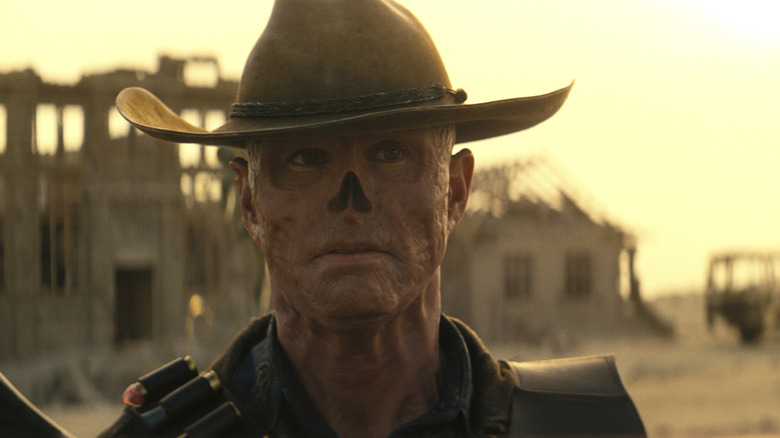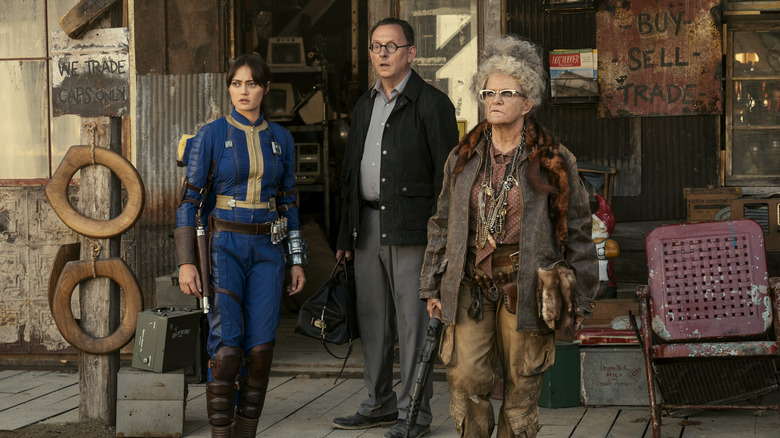Jonathan Nolan Reveals How Fallout Secretly Influenced The Dark Knight Rises - Exclusive Interview
From the moment the first teaser trailer for Amazon Prime's "Fallout" series exited the vault, longtime fans of the video game franchise could tell they were in for something special. More details about the "Fallout" show, such as the fact Jonathan Nolan directed the first three episodes, likely made that anticipation grow higher.
Jonathan Nolan, brother to now-Oscar winner Christopher Nolan, is no stranger to the world of high-concept science fiction. He worked on the screenplays for movies like "The Dark Knight," "The Dark Knight Rises," and "Interstellar," and a previous TV outing saw him bring "Westworld" to the masses. He's a perfect fit for "Fallout," which centers on a post-apocalyptic world where a vault dweller, Lucy (Ella Purnell), who's spent all of her life sequestered from the chaos of the wasteland, has to venture outside on a dangerous mission. Of course, there are plenty of other colorful characters she'll encounter, including Maximum (Aaron Moten) — a member of the Brotherhood of Steel — and an unrecognizable Walton Goggins as The Ghoul.
Looper had the pleasure of speaking with Jonathan Nolan for an exclusive interview on "Fallout" ahead of its debut on Prime Video on April 11. As it turns out, Nolan's been a fan of the "Fallout" franchise going back to "Fallout 3," which may have (subconsciously, at least) influenced a bit of "The Dark Knight Rises."
Similarities between Fallout and The Dark Knight Rises
What was your relationship like with the "Fallout" franchise prior to working on the show, and then how much did the games influence the direction in which you took the series?
Yeah, I think it started for me with a love of the games. I started with the franchise in "Fallout 3." Graham [Wagner], one of our showrunners, started from the very, very beginning, OG, the very first game. But I started with "Fallout 3" with [game director] Todd Howard's first entry in the franchise, and I just never experienced anything quite like it. And the games are so weird and so unique in their tone and their scope. The ambition of the storytelling, the moral ambiguity of it, the darkness, the political, satirical, subversive qualities, all these things, that I just thought were extraordinary in gaming.
And so it really, for us, started there. It started with a love of these games and a desire to take that unique tone from the games and bring them to, I wouldn't say a wider audience because these are incredibly popular games, but maybe to an audience that hadn't experienced it before.
You mentioned getting your start with "Fallout 3." I believe there's a quote from you where you jokingly said that "The Dark Knight Rises" may have been delayed a bit because of "Fallout 3." Did "Fallout 3" maybe influence "Dark Knight Rises" since that movie does involve nuking a city?
Good question. Yeah, to some degree, probably impossible that it didn't on some level because I was playing that game and thinking about where we would go with that franchise. I think one of the things that I thought was so ... And actually it's funny, it's true. I remember having a conversation, not necessarily especially about "Fallout," but one of the experiences that you have playing "Fallout" is it just goes there.
"Fallout" is the experience of the pond that you're playing in just getting bigger and bigger until it's an ocean. The experience of playing those games is one in which the grandeur of it, the ambition of it, it just goes there and it goes there in terms of the world being over and trying to figure out, okay, what happens after that? And I think to some degree, yeah, I think that one of the things that we talked about with "The Dark Knight Rises" that may have been kicking around in my head, in part because the experience of playing these games was that desire. In all the Batman movies, there's this moment where it's, "Batman's going to save the city!" And the question was, well, what if he didn't? What if we went there? What if we went into a version of Gotham in which he loses, they lose? And you have to consider what happens after the world is over.
Telling the story of Fallout on TV versus as a video game
Was there anything you were excited about exploring in the world of the "Fallout" show and diving into something that was maybe overlooked in the games or that you wanted to flesh out a little more?
I don't think there's anything for me in these games that is overlooked. I mean, one of the incredible things about the "Fallout" games is that your experience of playing one of these games would be very different than mine. They're not on rails. You have your own experience. You join a different faction. You might've played for the Brotherhood or the New California Republic. All of our experiences were different. And there's so much attention to detail in these games. It was one of the intimidating things about working on this adaptation. These games are so beautifully made. You can literally walk through these vast environments — and the environment is almost as much of a character in the games as any of the other characters — and pick up almost any object and look at it. So there's almost nothing in the games that's overlooked.
One of the things that we got to do that I realized was kind of a unique benefit of the kind of storytelling that we can do in television ... And, look, to be honest, with some adaptations, you're adding things and taking things away. An adaptation of a video game you're losing so much. You're taking away the player's freedom to make moral decisions. You're taking away their ability to explore. But one of the things you do get to do is you get to add reality. And in the case of these games, we got a chance to explore that world before the end of the world, which is so unique in "Fallout" and speaks so much to what the franchise is about and the political commentary of it. You have a version of America in which they never had that national reflective moment. They never had a Watergate. They never had that crisis of confidence that America had in the late 20th century. And so you're looking at a slightly different America, and we get a chance to explore that in flashback.
Look, every medium has its own advantages. One of the advantages of television is that you do get a chance. There's almost an invitation to step back in time and see this world before the fall and try to understand, in part, what led to the end of the world.
Keeping the Western alive with Fallout
You've gone from working on "Westworld," a sci-fi Western, to now "Fallout," also a sci-fi Western. Since the traditional Western isn't as prevalent as it once was decades ago, is this kind of how you see the genre staying alive and relevant?
I so admire people who are able to work outside the genre, but I've never had any interest. I just love weird, wild worlds that we get to build in here. But one of the things about genre is it does allow you to explore the moral landscape in which there's no authority figures. I think that's one of the enduring appeals of the Western.
But there's also this beautiful ability in genre filmmaking, and I'm so excited to see comic book movies in 20 years. I'm so excited to see what the next Sergio Leone does with the comic book movie. Because you get to a point where you're kind of exhausted with the genre, and that's what happened with Westerns. In the '50s and '60s, you had whole studios that were just devoted to making Westerns. We shot "Westworld" up on Melody Ranch in Santa Clarita, California, where they had shot, I think, at one point, 800 Westerns in the 1920s and '30s. Just insane. And so there's a point of exhaustion with a genre.
And then there's a point a little later where it gets weird, and it gets exciting again because you get to take a genre, and everyone knows the rules of that genre, and you get to turn them inside out, and you get to subvert them. "Fallout," to me, right out of the gate, is a subversion of the Western, in this kind of fascinating way. The Western is about "Civilization is coming." It's on the way. And that's the feeling that you get in one of my favorite Westerns, "Once Upon a Time in the West." Sweetwater is coming, and civilization's on the way. The railroads are literally blasting their way through the landscape. And so you know that encroaching civilization is going to come. Before it gets there, you can kind of chart your own destiny, and that's the fantasy of a Western. There's a world without rules, a world in which you get to chart your own course.
In "Fallout," it's the opposite story. Civilization is leaving. Civilization has left the building. It's the same fantasy, without rules and a world in which you can make any choice you want, which is uniquely suited to a role-playing game in which you get to make those choices. The possibilities are kind of endless.
Between Fallout and Oppenheimer, the Nolans are on a nuclear streak
With "Oppenheimer" having come out last year, it seems the Nolans are very interested in this idea of nuclear annihilation. They're admittedly very different projects and tones, but did you bounce ideas off of Chris on how to handle such heavy themes?
No, it's just one of these coincidences. I mean, obviously, two brothers, and we do talk to each other all the time about everything we're working on. I wouldn't say a happy coincidence, but a coincidence that we wound up working in spaces that were the same. And, slightly frustrating for me, because one of the things I had figured out early on ... I watched a bunch of test footage, terrifying test footage of testing from Trinity onwards. But one of the things I noticed, there are only a few of those movies that feature the sound. You never think of it. You've seen all these giant fireballs. We looked at them over the years for different projects, but there are only a couple of them that had sound. And it was the sound that really struck me, and the fact that the sound didn't reach you for minutes, so you'd be watching this thing play out.
And so I was very excited about that idea and very excited to bring it into the prologue that opens the show, that idea that maybe two people would have this horrifying experience of seeing the end of the world long before they heard it or felt it. And then, of course, Chris moved a little faster, so we got a chance to experience his version of that first. But I think they're very different, and I'm proud of both of them.
It is a terrifying sequence. I mean, the theater we watched it in was just silent, and it's truly horrific. I don't know how much we can get into the future, but are there any ideas you would hope for in the future of the "Fallout" series or anything you want to kind of take from the games and explore even further? Hopefully, this lasts for many more seasons.
Yeah, no, I hope so too. We're having so much fun. It's such an amazing ... Such a privilege for me to work with such a talented cast and such a talented crew. And with [showrunners] Geneva [Robertson-Dworet] and Graham, first and foremost, these incredible storytellers. I can't wait to see where they want to take this and where we're going to go next, should we be so lucky.
All eight episodes of "Fallout" premiere on Prime Video on April 11. This interview has been edited for length and clarity.
